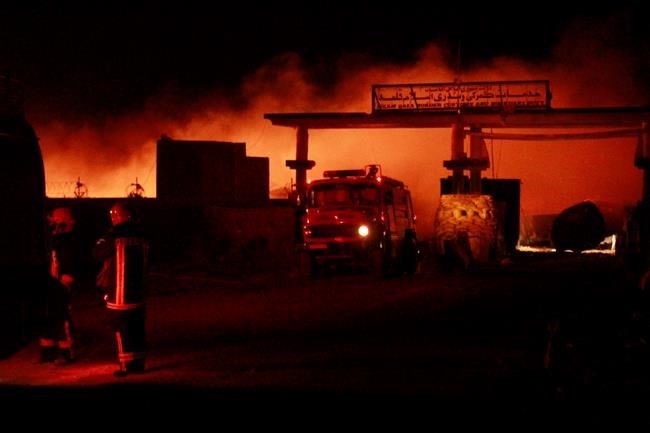
Iranian firefighters work on a burning tanker carrying fuel at the Islam Qala border with Iran, in Herat Province, west of Kabul, Afghanistan, Saturday, Feb. 13, 2021. A fuel tanker exploded Saturday at the Islam Qala crossing in Afghanistan's western Herat province on the Iranian border, injuring multiple people and causing the massive fire that consumed more than 500 trucks carrying natural gas and fuel, according to Afghan officials and Iranian state media. (AP Photo/Hamed Sarfarazi)
Republished February 14, 2021 - 3:08 AM
Original Publication Date February 14, 2021 - 1:26 AM
KABUL - Firefighters struggled for a second day Sunday to battle a massive fire that began when a fuel tanker exploded at a major crossing in Afghanistan’s western Herat province on the Iranian border, officials said.
At least 20 people were injured and many of the more than 500 trucks lined up at the Islam Qala crossing carrying natural gas and fuel were still ablaze, according to Afghan officials and Iranian state media.
Herat provincial Gov. Wahid Qatali said first responders were quickly overwhelmed Saturday by the huge, out-of-control fire. “When each cylinder was exploding it was flying 100s of meters high,” he told The Associated Press.
Two explosions at the border crossing were powerful enough to be spotted from space by NASA satellites. One blast erupted around 1:10 p.m. Afghan time (0840 GMT), the next around a half-hour later at 1:42 p.m. local (0912 GMT).
The United States allows Afghanistan to import fuel and oil from Iran as part of a special concession that exempts Kabul from U.S. sanctions against Iran. Satellite photos taken Saturday before the explosion showed dozens of tankers parked at the border crossing.
Qatali said officials were concerned that windy conditions Sunday could fan the flames and spread the fire to even more fuel-laden trucks in the area. He said the government was able to save more than 1,200 trucks.
Herat's chamber of commerce and industries chief Younus Qazizada said the explosion and fire started when provincial customs employees were inspecting a gas tanker. But an investigation into the cause of the fire continued Sunday.
“If the government would have invested the income of a single day of customs (tariffs) in the firefighting department this chaos wouldn't have happened,” Qazizada said.
Iran’s semi-official ISNA news agency reported an estimated $50 million loss of goods and consignments in the catastrophe. Qazizada estimated the losses were twice that much.
Qatali, the provincial governor, said the investigative team will inspect video footage of the area but Wakel Ahmad Karokhi, a Herat provincial council member, said the customs facility was entirely consumed by the fire.
The fire spread Saturday to the Dogharoon customs facilities on the Iranian side of the border and first responders — including the fire department, the Iranian army and border forces — were assisting in extinguishing the blaze, according to Iranian state television. The Afghan side of the border crossing has its own fire department, but officials in Herat said they were never in control of the blaze.
Iran sent 15 firefighting units to the Afghanistan side to help.
The Islam Qala border crossing is around 120 kilometres (75 miles) west of the city of Herat and is a major transit route between Afghanistan and Iran.
The Afghan government is working on an alternative to resume trade between the two countries, as Afghanistan is mostly dependent on imported goods from neighbouring countries. Iran officials say that they will accelerate the custom process at other border crossings with Afghanistan.
The fire continued to burn Sunday and the explosions shut down the power grid between Iran and Afghanistan, leaving Herat in the dark, said Wahidullah Tawhidi, spokesman for the Afghan Ministry of Power Supply.
According to ISNA, Iranian authorities allowed 2,000 trucks to move into the Iranian side from Islam Qala to prevent further damage. Seven of the injured were transferred to hospitals inside Iran.
___
Tameem reported from Kabul. Associated Press writers Rahim Faiez in Kabul and Nassir Karimi in Tehran, Iran contributed.
News from © The Associated Press, 2021